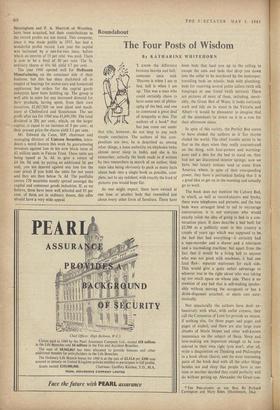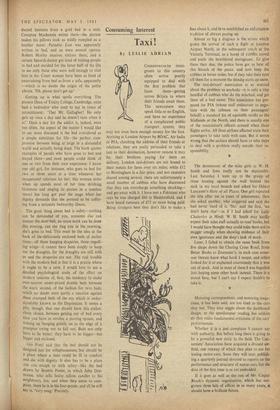Roundabout
The Four Posts of Wisdom
By KATHARINE WHITEHORN • '1 KNOW the difference between heaven and hell,'
As one might expect, there have existed at one time or another beds that resembled just about every other form of furniture. There have been beds that haul you up to the ceiling to escape the ants and beds that drop you down into the cellar to be murdered by the innkeeper; travelling beds on wheels; beds with plumbing; beds for receiving several polite callers (with silk hangings) or one friend (with mirrors). There are pictures of most of them, including, inevit- ably, the Great Bed of Ware; it looks curiously stark and tidy on its stand in the Victoria and Albert—it would be pleasanter to imagine that all the attendants lie down on it in a row for their afternoon siesta.
In spite of this variety, the Perfect Bed seems to have eluded the authors as it tias maybe eluded the world. The chief trouble seems to be that in the days when they really concentrated on the thing, with four-posters and warming- pans and a dais for the bed to stand on, they had not wt discovered interior springs; now we have, but luxury notions tend to come from America, where, in spite of their overspending power, they have a puritanical feeling that it is a good idea to get up in the morning and actually go to work.
The book does not mention the Culture Bed, in which, as well as record-players and books, there were telephones and pictures; and the two beds were arranged head to tail to encourage conversation; it is not everyone who would exactly relish the idea of going to bed in a con- versation piece. It does describe a bed built for £2,500 as a publicity stunt in this country a couple of years ago which was supposed to be the bed that had everything—it certainly had a tape-recorder and a shaver and a television and a tea-making machine; but apart from the fact that it would be a living hell to anyone who was not good with machines, it had one fatal flaw: separate mattresses for each side. This would give a quite unfair advantage to whoever was in the right about who was taking up too much space on whose side. There is no mention of any bed that is self-making (prefer- ably without moving the occupant) or has a drink-dispenser attached; or ejects cats auto- matically.
Not unnaturally the authors have dealt ex- haustively with what, with awful coyness, they call the Commerce of Love (to provide an excuse, if nothing else, for those pages and pages and pages of nudes); and there are also large, irate chunks of Marie Slopes and other well-known insomniacs on the subject of Sleep. Sleep and love-making are important enough to be con- sidered in their own right (you don't, after all, write a disquisition on Thinking and Philosophy in a book about chairs), and the most interesting parts of the book deal with all the other things besides sex and sleep that people have at one time or another decided they could perfectly well do without getting up. Alexander the Great con- • THE PHILOSOPHY OP THE BED. By Richard Carrington and Mary Eden. (Hutchinson, 30s.) ducted business from a gold bed in a tent; Compton Mackenzie writes there—the picture makes his pillows look as wildly rumpled as a heather moor; Paradise Lost was apparently written in bed, and so were several operas; Robert Morley receives visitors there; and a certain Spanish doctor got tired of visiting people in bed and decided for the latter half of his life to sec only those who were well enough to visit him in his. Court women have been as fond of entertaining from bed as from a sofa, apparently —which is no doubt the origin of the polite phrase, 'Oh, please don't get up.'
Getting up is what spoils everything. The present Dean of Trinity College, Cambridge, once had a bedmaker who used to say in tones of astonishment: 'That Mr. Gallagher! He only gets up once a day and he doesn't care when it is!' Once a day for the addict is, indeed, once too often. An aspect of the matter I would like to see more discussed is the bed considered as a simple substitute for life—the perfect com- promise between being at large in a distasteful world and actually being dead. The book quotes examples of people who have gone to bed and stayed there—and most people could think of one or two from their own experience. I know one old girl, for instance, who goes to bed for two or three years at a time whenever her exasperated relations let her; this woman (who when up spends most of her time drinking Guinness and singing its praises in a tuneless tenor) has long got past the stage when her dignity demands that she pretend to be suffer- ing from a seriously bedworthy illness.
The great thing about bed is safety—nothing can be demanded of you, someone else can answer the door-bell, no more work can be done this evening, can she ring you in the morning, she's gone to bed. This must be the idea at the back of the 'deliciously enclosed beds of earlier times—all those hanging draperies, those engulf- ing wings—it cannot have been simply to keep out the draughts, for the draughts are still with us and the draperies are not. The real trouble with the modern bed is that it is a prairie where• it ought to be a cave. I would love to see a detailed psychological study of the effect on modern tensions of, first, the tendency to make over-narrow under-priced double beds between the wars; second, of the fashion for twin beds, which no doubt were partly a reaction against these cramped beds of the era which is under- standably known as the Depression. It seems a pity, though, that one should have this melan- choly choice, between getting out of bed every time you have to revolve a snoring spouse, and waking up hanging grimly on to the edge of a precipice trying not to fall out. Beds not only have to be better; they have to be bigger—but bigger and enclosed.
Gio Ponti said that the bed should not be designed just for voluptuousness, but should be a place where a man could be ill in comfort and die with dignity. It also has to be a place one can 'escape to with safety—like the bed drawn by Beatrix Potter, in which John Dor- mouse, who sells faulty tallow candles to his neighbours, lies; and when they come to com- plain, there he is in his four-poster, and all he will say is, `Very snug.' Precisely.







































 Previous page
Previous page